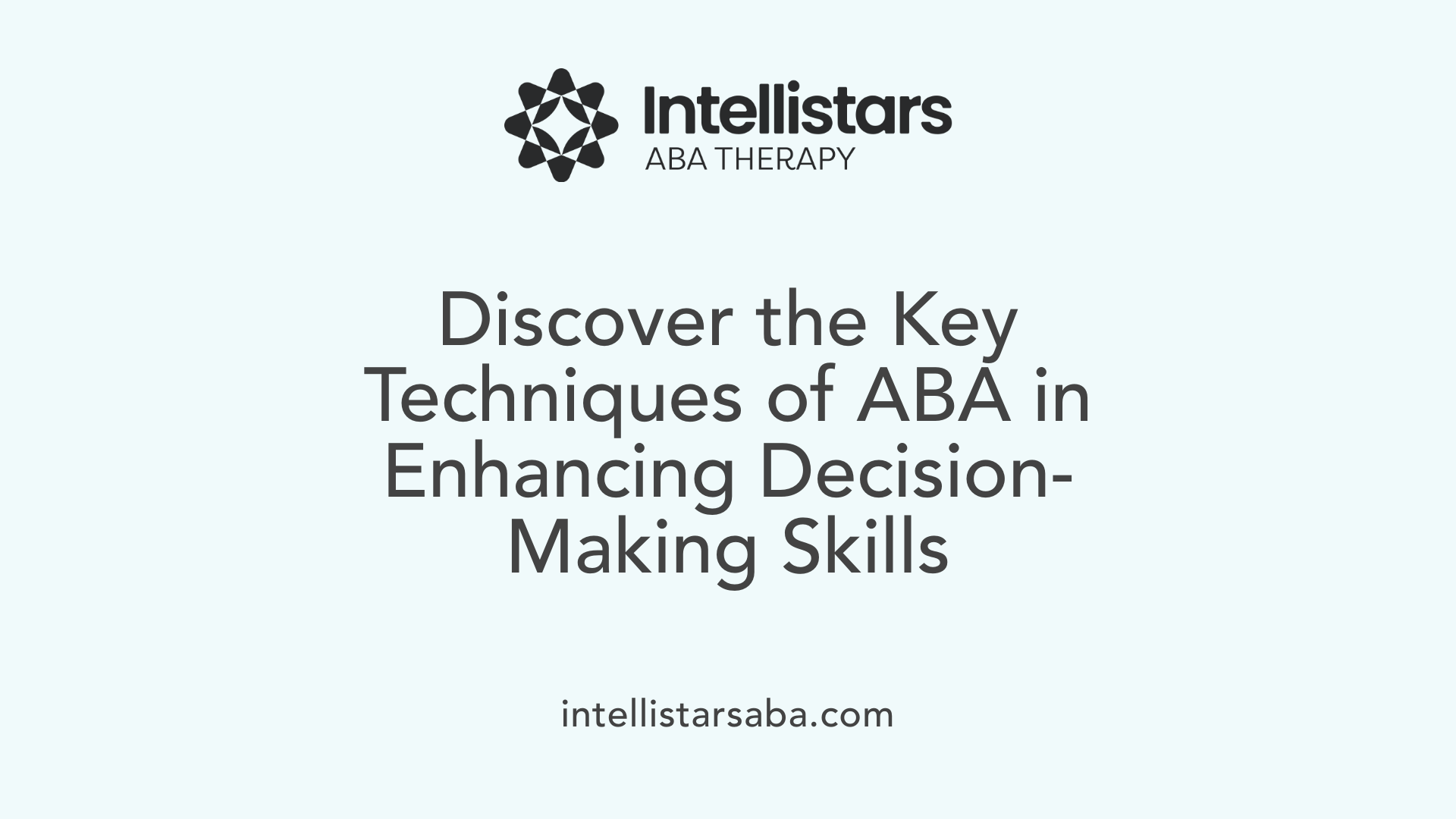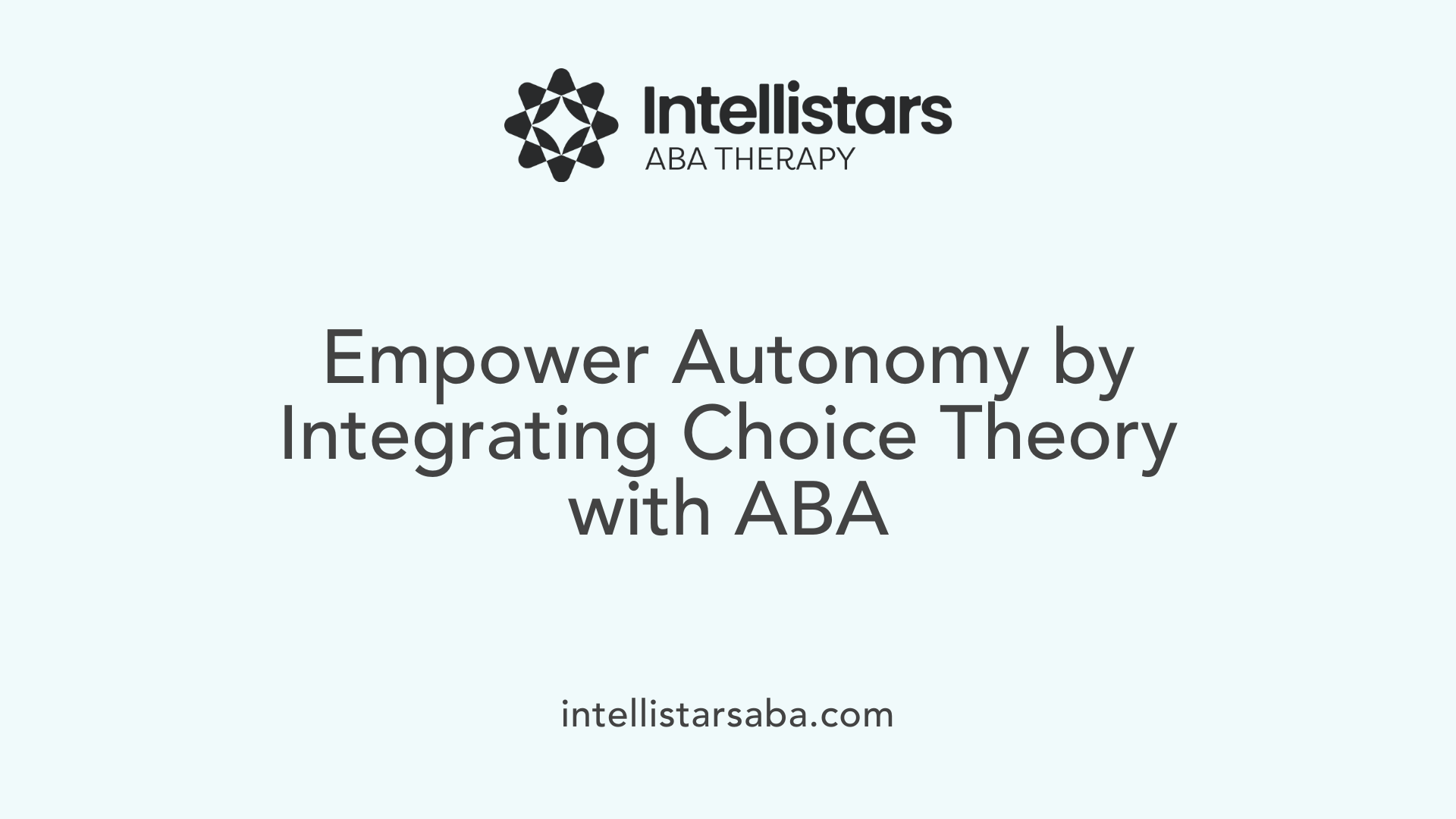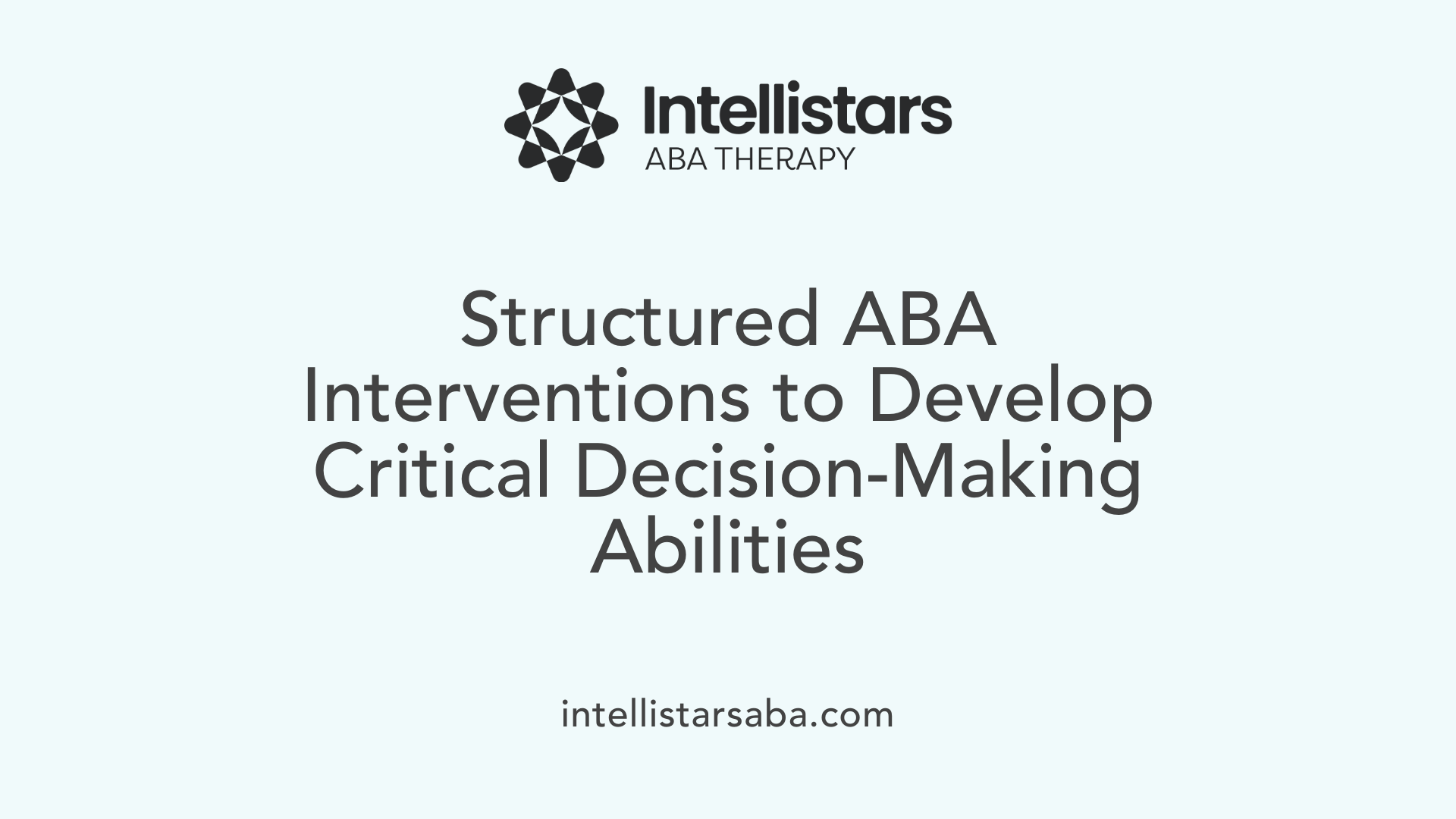Understanding the Power of ABA in Developing Critical Life Skills
Applied Behavior Analysis (ABA) therapy is a cornerstone intervention for supporting individuals with autism. While it is widely recognized for reducing challenging behaviors and improving communication, its impact on strengthening decision-making skills is equally significant. This article explores how ABA employs specific principles, techniques, and theories—particularly choice theory—to empower autistic individuals to make informed, confident decisions and gain greater independence across all areas of life.
Core Principles and Techniques of ABA in Decision-Making
 ABA therapy employs several foundational principles and techniques aimed at improving decision-making skills in individuals with autism. Central to this approach is the reliance on reinforcement and prompting. Reinforcement involves providing rewards or positive feedback when a desired decision or behavior occurs, encouraging individuals to repeat effective decision-making patterns. Prompting, on the other hand, guides individuals towards appropriate choices by offering cues or assistance that gradually fade as independence and confidence grow.
ABA therapy employs several foundational principles and techniques aimed at improving decision-making skills in individuals with autism. Central to this approach is the reliance on reinforcement and prompting. Reinforcement involves providing rewards or positive feedback when a desired decision or behavior occurs, encouraging individuals to repeat effective decision-making patterns. Prompting, on the other hand, guides individuals towards appropriate choices by offering cues or assistance that gradually fade as independence and confidence grow.
Another vital strategy is breaking down complex decisions into manageable steps. This systematic approach simplifies choices, reduces overwhelm, and enhances understanding. For instance, instead of asking a child to decide what to wear immediately, an intervention might involve selecting between two outfits step-by-step, reinforcing each successful choice.
Naturalistic teaching strategies integrate decision-making opportunities into everyday routines. These strategies embed learning within naturally occurring environments like play, mealtime, or community outings, promoting the transfer of skills across settings. By observing and responding to real-life situations, individuals learn to apply decision-making skills in meaningful contexts.
Data collection and individualized interventions are crucial components. Behavior analysts gather detailed information about a person’s behavior and preferences, which informs tailored strategies that address specific needs and functions. This personalized approach helps build decision-making abilities that are relevant and sustainable.
Together, these principles and techniques foster autonomy by encouraging individuals to evaluate options, understand consequences, and make informed choices. Ethical practice requires that interventions respect each person’s dignity and preferences, ensuring that decision-making opportunities are empowering rather than burdensome.
| Technique | Purpose | Application Example | Additional Details |
|---|---|---|---|
| Reinforcement | Increase effective decision-making behaviors | Providing praise when a child chooses an appropriate snack | Reinforces positive choices |
| Prompting | Guide towards correct choices | Giving a visual cue to select a matching item | Fades over time to promote independence |
| Breaking decisions into steps | Simplify complex choices | Asking a child to choose a shirt then a pair of pants step-by-step | Builds confidence gradually |
| Naturalistic teaching strategies | Embed choices in daily routines | Offering different activities during playtime to choose from | Promotes generalization of skills |
| Data collection and assessment | Personalize interventions | Tracking decision-making progress over sessions | Ensures strategies are effective |
Understanding and applying these techniques allow behavior analysts to support individuals with autism in developing stronger decision-making skills that contribute to greater independence and improved quality of life.
Applying Choice Theory within ABA to Foster Autonomy

How does ABA therapy improve decision-making skills in individuals with autism?
ABA therapy enhances decision-making skills by systematically teaching individuals to recognize various choices and understand their consequences. Therapists employ structured methods that incorporate play-based activities to keep learning engaging and motivate participation. These activities aren’t just fun; they are carefully designed to develop critical cognitive skills like problem-solving, sequencing, and memory—traits essential for making informed choices.
Role-playing exercises, social games, and real-world scenario simulations give children practical opportunities to practice decision-making in social settings. This hands-on approach helps to generalize learned skills across different environments, improving social understanding and communication. By repeatedly reinforcing positive decisions and guiding children through decision-making processes, ABA fosters independence and confidence.
Integrating principles of choice theory, ABA supports the idea that personal choice and responsibility directly influence behavior. When children are given meaningful options and see their decisions lead to positive outcomes, their motivation and engagement increase. This process helps them to understand that their actions matter, cultivating autonomy and empowering them to make better decisions in daily life.
Building Decision-Making Skills Through Structured Interventions

What are the benefits of ABA therapy in developing decision-making abilities for individuals with autism?
ABA therapy provides numerous advantages when it comes to enhancing decision-making skills in individuals with autism. It promotes independence by teaching essential life skills through structured, personalized approaches.
One effective method involves breaking down complex choices into smaller, manageable steps. This helps individuals process information more comfortably and reduces overwhelm, making decision-making more accessible.
Additionally, role-playing and modeling are vital strategies within ABA. By simulating real-life scenarios, therapists demonstrate decision-making processes, allowing individuals to observe and practice appropriate responses in a safe environment.
Reinforcing positive decisions is another crucial element. Praising correct choices encourages continued adaptive behavior, boosting confidence and autonomy.
Teaching problem-solving and sequencing skills further supports the decision-making process. These skills enable individuals to analyze options, consider outcomes, and execute steps logically, which translates into better choices in everyday situations.
Data-driven assessments allow therapists to tailor interventions to each person’s unique needs. This personalized approach ensures that skills are generalized across different settings and become integral parts of daily life.
Ultimately, ABA therapy facilitates the development of decision-making by fostering critical thinking, communication, and social understanding. These improvements help individuals navigate and participate more fully in their environment, thereby enhancing their overall quality of life.
Supporting and Enhancing Decision-Making in Daily Life
How does ABA therapy support decision-making skills in children with autism?
ABA therapy plays a vital role in improving decision-making abilities for children with autism by systematically addressing challenges that can hinder autonomous choices. At its core, ABA helps children evaluate options, anticipate potential outcomes, and develop functional skills essential for independence.
One effective approach used within ABA is teaching children to analyze choices through methods like simplified questions or a closed questions approach. This method reduces sensory overload and gives children clear, manageable options, making decision-making less overwhelming.
ABA also promotes understanding of the consequences of different actions. Through consistent reinforcement and structured learning, children learn to recognize how their choices lead to specific results, which enhances their decision-making process in familiar and unfamiliar settings.
Generalization of skills across various environments is a key goal of ABA therapy. By practicing decision-making in controlled settings and then applying these skills in natural contexts such as home, school, and social situations, children become more adaptable and confident.
Furthermore, ABA programs emphasize social and functional behaviors, fostering skills like taking turns, sharing, or understanding social cues. These skills are crucial for making socially appropriate decisions and navigating everyday interactions.
Integrating virtues of choice theory, such as recognizing personal responsibility and supporting autonomy, ABA therapy encourages children to make choices that reflect their interests and needs. Offering options and celebrating all decisions helps build confidence and a sense of control.
Overall, ABA provides a structured, supportive framework for children with autism to enhance decision-making skills, which translates into greater independence and improved social relationships. Tailored interventions that respect each child's unique strengths and preferences ensure that children are empowered to make meaningful choices, fostering lifelong skills that benefit their overall development.
Holistic Approach and Family Involvement in Decision-Making Development
What are the benefits of ABA therapy in developing decision-making abilities for individuals with autism?
ABA therapy profoundly supports the development of decision-making skills in individuals with autism. It emphasizes fostering independence and teaching life skills through targeted, structured interventions. By reinforcing positive choices and setting personalized goals, ABA helps children enhance their critical thinking and problem-solving abilities.
This therapy also improves communication and social skills, which are vital for understanding social cues and making informed decisions. Through continuous assessment and data collection, therapists adapt strategies to meet each individual’s unique needs, promoting the transfer of skills across different environments.
A comprehensive approach involves family members and caregivers as active partners. Collaboration strengthens consistency in applying strategies, enabling children to generalize their decision-making skills beyond therapy sessions.
Ultimately, ABA empowers individuals with autism to make clearer, more confident choices, enriching their daily lives and fostering greater independence.
How does family involvement enhance decision-making development?
Family and caregiver participation is essential in creating holistic, effective ABA programs. When families are involved, interventions can be better tailored to the child's specific contexts and daily routines.
Parents and caregivers serve as mediators of learned skills, providing reinforcement at home and supporting consistency in decision-making opportunities. Their insights help therapists identify what strategies work best and evolve as the child's needs change.
Educational and emotional support for families ensures they understand the goals of ABA therapy and are equipped to facilitate decision-making practice in real-world situations.
How can a comprehensive assessment guide individual treatment plans?
An in-depth assessment evaluates the child's strengths, challenges, sensory sensitivities, executive functioning, and communication abilities. This foundation informs personalized treatment plans that target specific areas for growth.
The plan prioritizes decision-making skills in the context of each child's daily routines, social interactions, and emotional well-being. It incorporates meaningful choices, modeling, role-playing, and reinforcement strategies tailored to individual preferences.
What are the lifelong benefits of decision-making skills learned through ABA?
Developing decision-making skills has a lasting impact, supporting children in school, social settings, and daily life. These skills promote autonomy, confidence, and resilience.
Children equipped with strong decision-making abilities tend to navigate challenges more effectively, make better social choices, and pursue personal goals with independence.
Summary Table:
| Aspect | Benefits | Implementation Strategies |
|---|---|---|
| Personalized Assessment | Tailors interventions to individual needs | Use of comprehensive assessments, family input |
| Family Collaboration | Reinforces skills at home | Regular communication, shared goal-setting |
| Skill Development | Fosters independence and confidence | Choice-based activities, modeling, reinforcement |
| Lifelong Impact | Enhances quality of life | Ongoing support, skill generalization |
Through a blend of structured interventions and active family roles, ABA fosters decision-making abilities that empower individuals with autism for a more independent future.
Combating Unsafe Practices and Ensuring Ethical Standards
When providing ABA therapy, it is crucial to avoid unsafe practices that can harm the child's well-being. Techniques that rely on punishment or negative approaches, such as harsh reprimands or overly generalized programs, may lead to emotional distress or even loss of trust. Instead, practitioners should focus on individualized treatment plans that respect the child's unique strengths, needs, and preferences.
Personalized approaches not only promote safety but also encourage motivation and genuine learning. Tailoring interventions ensures that therapy is effective, meaningful, and supportive of the child's development while maintaining their emotional safety.
Continuous monitoring of therapy sessions is vital. Parents, caregivers, and therapists should actively participate, ask questions, and observe behaviors to assess whether the therapy helps the child or causes discomfort. If interventions are unhelpful or harmful, adjustments should be made promptly.
Signs that warrant reviewing or stopping ABA include signs of distress or harm, lack of progress, or if the child appears uncomfortable consistently. Regular evaluation fosters a safe environment focused on positive growth.
Advocacy for safe and ethical ABA involves advocating for transparency, evidence-based practices, and collaboration with families. Ensuring that therapy aligns with ethical standards helps promote a child's well-being and supports positive long-term outcomes.
Conclusion: Empowering Individuals Through Decision-Making Skills
Developing decision-making skills through ABA therapy offers lifelong advantages for individuals with autism. When equipped with the ability to make choices confidently, they gain independence in daily activities, social interactions, and educational settings. These skills foster a sense of empowerment, helping individuals navigate life's various challenges more autonomously.
The relationship between ABA principles and personal autonomy is central to effective intervention. By integrating insights from choice theory—which highlights the importance of personal choice and responsibility—ABA can be tailored to support individuals’ needs and desires. Offering meaningful options and respecting individual preferences encourage motivation, engagement, and a sense of control.
Looking ahead, future directions in ABA therapy are likely to focus on further personalizing approaches to decision-making development. Innovations may include more adaptive tools for assessing decision-making difficulties and strategies that seamlessly blend behavioral techniques with insights from cognitive and emotional sciences. Continuous research is vital to refine methods that promote authentic autonomy while ensuring safety and emotional well-being.
As ABA evolves, emphasizing Collaboration with families and caregivers remains essential. Ensuring that therapies are respectful, individualized, and empowering will help individuals with autism achieve greater independence and a richer quality of life.
Exploring future trends underscores the importance of integrating technological advancements and personalized strategies to maximize decision-making skills. These will serve to support meaningful participation in society, enabling individuals with autism to lead more autonomous and fulfilling lives.
Fostering Independence and Lifelong Success
ABA therapy plays a vital role in enhancing decision-making skills for individuals with autism. By leveraging principles like reinforcement, choice theory, and personalized interventions, ABA not only reduces maladaptive behaviors but also actively promotes autonomy and confidence. The ability to make informed decisions empowers individuals across all areas of life—from daily routines to social interactions and academic pursuits—ultimately fostering independence and lifelong success. Ethical, tailored, and family-centered approaches ensure that ABA remains a safe and effective modality for nurturing decision-making skills and supporting the broader development of autistic individuals.
References
- Improving Decision-Making in Autism: 6 Practical Strategies
- What Is Choice Theory in ABA? - ABATherapistJobs.com
- How ABA Therapy is Transforming the Lives of Children with ...
- Applied Behaviour Analysis (ABA) and autistic children
- The effectiveness of applied behavior analysis program ...
- Applied behavior analysis
- Applied Behavior Analysis (ABA)
- What Is ABA Therapy? Everything You Need to Know






